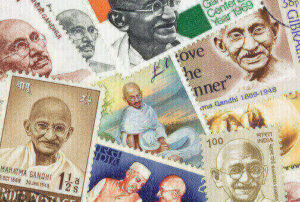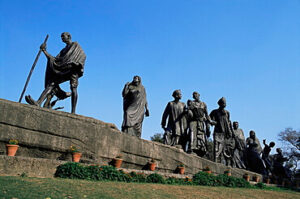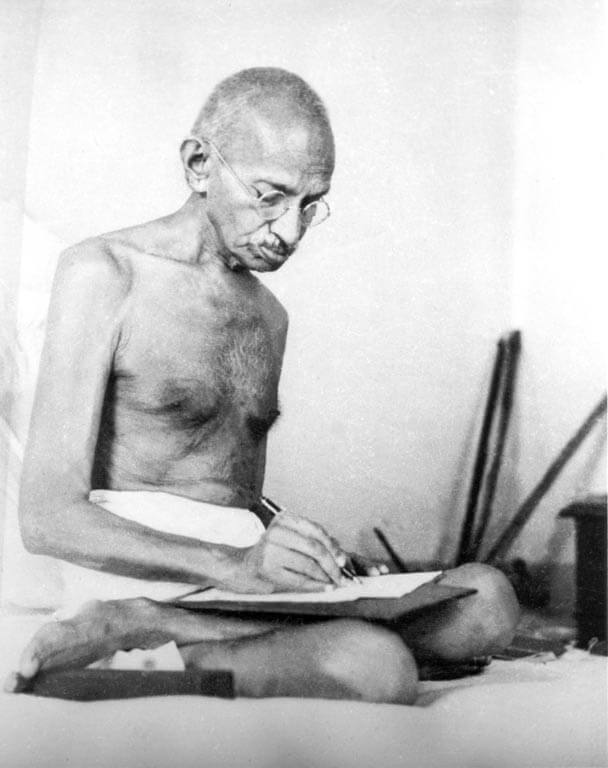Essay on Mahatma Gandhi for students
ESSAY ON MAHATMA GANDHI
It’s so funny and embarrassing for Indians if we ask Do you know about Gandhiji? Have you ever heard about Gandhiji?.
INTRODUCTION
To be honest, Gandhiji doesn’t need any introduction. He is literally settled in our spirit, mind and even every particle of our body.
Without the name of Gandhiji, I disagree with this point that India would have any recognition in front of other developed countries, in the context of fighting spirit with non-violence aspects, which majorly contributed to the independence of India.
He is popular among the people not only in India but also in other countries. His role was to dedicate his life to the welfare of the people.

EARLY LIFE AND FAMILY BACKGROUND
It’s obvious, a man becomes popular, then people want to know about his family background. So I am writing a few descriptions about his family in this essay on mahatma Gandhi.
Gandhiji was born on 2nd Oct. 1869. Mohan Das Karam Chand Gandhi is popularly known as Mahatma Gandhi. His father’s name was Karam Chand Gandhi who was Deewan (Chief Minister) of his Riyasat Porbandar (of the British time period )now in Gujarat state and he was the son of his father’s 4th wife, Putli Bai who was a very religious lady.
Gandhiji at the age of 13, got married to Kasturba. They had four sons named Harilal, Manilal, Ramdas, Devdas.
HIS EDUCATION AND ROLE
At the age of 11, he did high school. Due to his early marriage, he had to left his schooling, but later on, he again joined the school, consequently, he joined the local Samaldas college. But he was not satisfied with their studies. So he accepted the London proposal for studying the law.
Later on, in 1893, he went to Africa for the work of lawer.
HIS EXPERIENCE
In Africa, he had to face racial discrimination.
The story behind this, When he was pushed by train because he had taken a first-class ticket on the train. And Indian and black were not allowed to travel in 1st class compartment.
It was allowed to only white people. This incident had broken to Gandhiji most. He observed that this same incident is quite common to Indian and black people. Then he decided to protest against racial discrimination.
On 22 May 1894, he established Natal Indian Congress(NIC) in South Africa. Soon he became the leader of the Indian Community there and worked hard to improve the rights of Indians in South Africa.
He spent 21 years in Africa and fought for civil rights and at this time he was transformed into a new person.
RETURNED TO INDIA
Gandhiji returned to India permanently in 1915 and joined the Indian National Congress (INC) with Gopal Krishn Gokhle as his mentor. In 1918, he led the Champaran and Kheda agitation of Bihar and Gujarat.
He also led Non-Cooperation Movement, Civil Disobedience Movement, Swaraj, Quit India Movement against the British Government.
Gandhiji’s Satyagraha influenced prominent and illustrious personalities such as Nelson Mandela, Martin Luthar in their struggle for freedom, equality and social justice.
Mahatma Gandhi’s Satyagraha was based on true principles and non –violence.
“Live as if you were to die tomorrow. Learn as if you were to live forever.”Mahatma Gandhi.
ACHIEVEMENTS AND AWARDS
He edited several newspapers Harijan, Navjiwan, Young India. Some of his autobiographies are “The Story Of My Experiment With Truth”, “Hind Swaraj”, “Satyagrah in South Africa”,” Indian Home Rule”.
In 1930, Gandhiji was named the man of the year in Time’s Magazine.

In 2011, Time Magazine named Gandhiji as one of the top 25 political icons of all time.
He did not receive Nobel Peace Prize despite being nominated 5 times between 1937 -1948.
“Happiness is when what you think what you say and what you do are in harmony”. Mahatma Gandhi.
DEATH
Mohan Das Karam Chand Gandhi was assassinated on 30 Jan 1948 by Nathu Ram Godse. He was a Hindu nationalist and a member of the Hindu Maha Sabha. He accused Gandhi of favouring Pakistan and he was totally against Gandhiji’s Non-Violence principle.
THE QUOTE I LIKE THE MOST
Well, all quotes are my inspirational quotes. His quotes are really deep and logical.
but here I would like to say one of my favourite quotes in this essay on Mahatma Gandhi.
“ ALL ROUND DEVELOPMENT OF BODY, MIND AND SOUL.”
He doesn’t mean education as literacy.
MY VIEWPOINT ON THAT
That means he used to think, students should not be sticky to their studies but Along with their studies, they have to keep the focus on their physical, emotional, mental development.
Nowadays, what people do to their children,
They just think their children are their property. Their children have to return their sacrifices,hard-earned money in the form of becoming Doctor, Engineer or any high paid salary holder.
I am not denying the expectations of parents.
but in the cost of their health, and only being sticky to study will deteriorate their future.
CONCLUSION
He would be always in the remembrance of people by spreading the message of non-violence, truth, faith in God. His method inspires youth not only in India but in other countries too.
His contribution towards the nation makes him distinctive from all. His self-sacrificing personality and dedication to good deeds are incredible.
His Non- Violence Movement in India impacted the people of India in a huge way that led to the independence of India.
Mahatma Gandhi will always remain in our hearts as an inspirational leader.
Thank you for reading- Essay on Mahatma Gandhi.
Also read – Essay on air pollution
